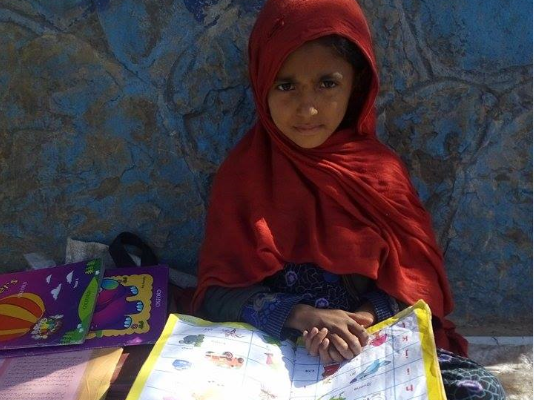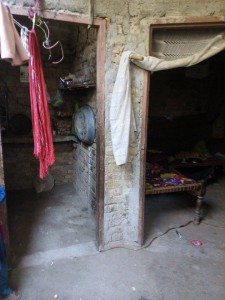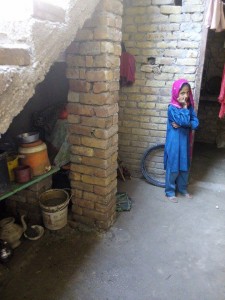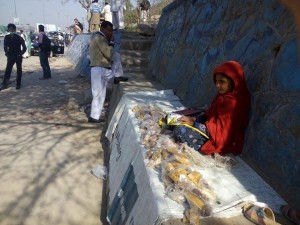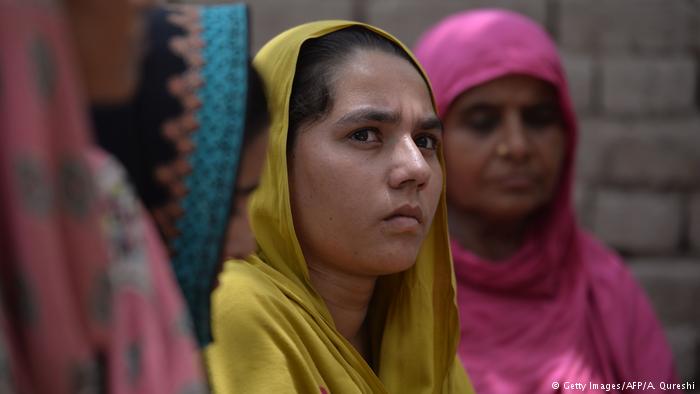Salma’s Story: Little Girls with Dreams Become Women with Vision
Today I am going to share the inspiring story about Salma, a seven-year-old girl who sells snacks at the bus stop and studies for her future.
I used to pass through a square near Benazir Bhutto International Airport Islamabad, Pakistan everyday, as it was the way to my office. One day I saw a young girl, aged around seven, sitting on the bus stop at the airport square and selling some snack packs to the passengers. I bought some snack packs, as one of my teachers told me once, if we buy something from a young person like her, it inspires and encourages him/her to work harder. In doing this we can play our part in improving the society.
I didn’t take much notice of her and just went away, because girls that sell snacks at traffic lights and on squares are quite common in many cities in Pakistan. Since poverty level is quite high, some people are compelled to involve their young children into such work to support their families. Children in these families normally never go to school and live their entire lives working on the roads to make ends meet.
One day, when I was passing the square, I saw that girl reading books. I was pleasantly surprised. I wondered, what study really meant to her, how this young girl managed to understand the importance of education, what was her expectation from life once she completed her study and what were her hopes and dreams.
Finally, one day I talk to her. When I arrived at the bus stop early in the morning, I saw her sitting on the same place. I greeted her and tried to start a conversation, but she was reluctant to talk to me.
She said, she needed to get permission from her father to talk to me. For her he was the one who was capable to evaluate, whether I was trustable to talk to or not. She introduced me to her father, who was selling cold drinks just a few yards away from her place. He smiled and allowed me to ask whatever I wanted. He told his daughter to take me home so I could meet the rest of the family, and could talk to them comfortably.
Salma was the name of this little girl. As Salma and I walked to her house, she seemed to start trusting me. After almost fifteen minutes of walk, we reached her house. It was in a slum area. We entered into a small house with only two small and dark rooms. I met the rest of the family: the mother, four girls and three boys. I wondered how they managed to live from such a limited income.
Salma’s mother can only communicate in Pashto, which is a regional language in Khyber Pakhtunkhwa, one of the province of Pakistan. So Salma helped us to communicate. I was surprised when I heard that this family was from one of the Pakhtun tribes, which are considered one of the most fundamentalist tribes in the country and do not allow their girls and women to have education or to work. Their girls and women are oppressed and are denied their rights at every stage of their lives. At least that is what I heard from news channels – national and sometimes international.
But here I heard a totally different story, so I tried to correct my concepts about women’s situation in Pakhtun tribes. If Salma was selling snack packs at the bus stop, obviously there are no strict limitations for girls/women in this tribe. I found out that Salma’s father allowed her to study in spite of the very tough financial situation. It means girls are allowed and even encouraged to get education. Salma’s mother is working as domestic helper. It means there are no strict limitations on mobility for women either.
So, there I was trying to re-learn what I had learned about women’s situation in those tribes. And at the same time I picked up some new and interesting stories.
A few months back Salma’s father had a paralysis attack so he was not able to make a living for the family. But Salma started selling snacks at the bus stop to support her family. Since then she has been working from dawn to dusk, and she takes her book with her to the bus stop. She sells snacks to the passengers and passersby during the day. When there are no customers around, she studies her books.
Salma told me that she enjoys reading books and hope to have a better life someday. Though her vision about life was not clear yet, but she knows that studying will bring a positive change in her life. She is happy and hopeful. I cannot explain those expressions of contentment that I saw on salma’s face.
Salma is giving a silent message to all those people who keep on blaming society, culture, political unrest and financial troubles for their hopelessness and failures in life. She gives a message that we can be hopeful even when we are facing years and years of troubles and discomfort.
I am amazed, how beautifully Salma managed to be independent and to help her family at such a young age, and at the same time studying her books. Now I am hopeful, whatever actions the police or corrupt politicians will take to oppress women and girls, such courageous girls of our nation will manage to be extraordinary in their own ways. And there will come a day when such courageous women and girls will make great changes in the society, that it will become impossible to oppress women and girls. They will make their way to success. I believe that little girls with dreams become women with vision.
Author: Roheena Sajid
Editor: Marjory Linardy
Roheena Sajid is a reader and has sent us this blog for publishing. Would you like to write for us, too? Send us an email at womentalk@dw.de.
WTO RECOMMENDS
Young Pakistani girls learn to speak up for their rights
For many Pakistani women, talking about gender issues is not easy The Leadership for Environment and Development Pakistan has organized a workshop to promote gender equality and say that the involvement of men in gender discourse is crucial to end violence against women in Pakistan. (From December 22, 2011)
‘Marry girls young, avoid rape’
To curb the increasing incidents of rape in Haryana, the local village leaders have come up with a solution. They have suggested that the marriageable age for girls be lowered to 16 years. According to Indian law, girls cannot get married before they turn 18. This shocking statement has come a day after a teenaged girl from a lower caste immolated herself after being allegedly raped in Jind district in Haryana, India’s state notorious for being unsafe for women. (From October 08, 2012)
Removing hurdles for Afghan girls in school
Women in Afghanistan suffered severely under the Taliban regime. They were prevented from going to school and working. Today, the country depends on help from abroad to guarantee schooling for girls. (From May 24, 2012)



